- Home
- Dave Gross
Pathfinder Tales: Lord of Runes Page 5
Pathfinder Tales: Lord of Runes Read online
Page 5
“No sooner than one might believe you’d joined the Mendevian Crusade. Count Varian Jeggare, crusader of Iomedae? Ha!”
“Or that you once donned the helm of a Gray Maiden and performed the dance of Shelyn’s seven feathers for the Sable Guard.”
At that he lunged toward me, his reaction confirming that the rumored details of his escape from the Sable Guard had substance. He enveloped me in bone-squeaking embrace. Arnisant growled, but I gave him the sign that all was well.
“I hadn’t heard you won the bid on the sun orchid elixir, you old bastard.”
“Have a care, Orisini. Men have suffered for lesser insults.”
“Lesser men, perhaps.” He slapped my back a little harder than friendship allows. “I’m saying you look twenty years younger than the last time I saw you, and I don’t mean elf years. You never learned to take a compliment like a man.”
He knew perfectly well it was his reference to my parentage that vexed me—not his notice of my revived youth, which had nothing to do with the fabled age-reversing elixir of Thuvia. I held him at arm’s length for a better look.
The years had been crueler to Vencarlo Orisini, whose blood was entirely human, than they had been to me, whose human blood mingled with elven. Vencarlo’s hair had grown more white than gray and more gray than black, although he still wore it tied back in the classic swordsman’s queue. He had gained a few more lines on his face and a few more inches around his waist. The glove on his right hand had not escaped my notice, nor did the fact that two of its fingers never moved. And yet in his storm-green eyes stirred the same violent righteousness for which the man had become famous—or infamous.
Vencarlo leaned out of the balcony. “Matteo! Make yourself useful and bring our guest a plate and goblet.” He offered me a seat. “I hope you will pardon the wine. I finished the last of yours last winter.”
“I recall your imbibing little.”
“I like drinking wine more than I used to.” In his sigh I heard the echo of my own regrets, all the more poignant since he had been little older than a boy when we first met, and now he looked older than I appeared. “Anyway, I drink more.”
“I shall instruct my factor to increase your shipment.” I produced a bottle from my satchel. “In the meantime, we have this.”
“The ’84?” He lowered his voice in mock awe as he accepted the bottle, yet I heard some sincerity beneath the scorn. He set to work on the cork.
“Here is a little more to replenish your cellar,” I said, removing the other bottles I had taken from Ygresta’s store room. The enchantments on my satchel made its interior the equivalent of a bookshelf—or, for tonight, a wine cellar. “An old friend recently passed on to Pharasma’s Spire, leaving behind seventy years’ of stock. If only he had told me he had given up drink, I would have sent some other token of remembrance.”
“Then we must toast the old teetotaler and beg Cayden Cailean for forgiveness on his behalf.”
“The god of drunkards never punishes the abstemious,” I said. “He pities them.”
“As must we all.”
Matteo came pelting up the stairs, pausing only to walk a wide path around Arnisant, who clearly outweighed him. Regaining his composure, the young man lay a pewter plate and goblet on the table. Over one arm he bore a basket containing more bread, fruit, and cheese, which he set before us. At the smell of food, Arnisant gave Matteo a firm poke with his nose.
“Arnisant!”
The hound froze as still as a Tian guardian statue. Seldom did he require a verbal admonishment, but he was quickly becoming a disgraceful beggar. It was time to reinforce his training.
“Is there anything else I can do to serve you, Master?”
“No.” Vencarlo’s stern expression betrayed not a shred of approval.
The boy’s shoulders slumped. He bowed and turned away. I raised an eyebrow at Vencarlo. He struggled to conceal a smile. Before Matteo reached the stairs, Vencarlo called out, “There is one more thing.”
Matteo turned, his face glum.
“Tell Dengaro your lessons begin in the morning.”
“Yes, Master!” The boy’s face brightened like the dawn. He bowed, nearly throwing himself to the floor in his excitement. “Thank you, Master!”
“Now leave us.”
Matteo practically floated down the stairs. A moment later, Dengaro’s voice boomed over the sound of the fencers. “What?!”
Matteo said, “I swear, Master Dengaro, I have only repeated the master’s words.”
“Is he so drunk already?”
Vencarlo chuckled. His voice had grown richer over the years, lairing deep within his chest.
“Dengaro will think you have gone soft.”
“Perhaps a trifle sentimental.” He filled my goblet, dashed out the contents of his, and refilled it from the fresh bottle. “To absent friends.”
We drank.
“On my way from the Acadamae, I heard a commotion on the Shingles,” I said. “At first I thought it might be the villain Blackjack, but the laugh sounded more like a woman’s.”
“If you mean the hero Blackjack, who liberates the wealth stolen from the poor … Well, I agree the laugh could use some work.” He thought for a moment. “Was it a woman’s voice?”
The implication surprised me. If he was unsure whether the new Blackjack I had heard was a man or a woman, he must have had more than one successor. “You are expanding the franchise?”
“Forget I said anything.” He shrugged. “I should be more circumspect when talking with a count of Cheliax. After all, we have not always been on the same side.”
“Indeed.” I left unspoken what we both understood: it remained possible we would be set against each other again one day. “I still say yours was the best laugh.”
“Did you know that Fedele once confided in me, during a lesson, that he wished he had come up with that laugh first? He had no idea he was complimenting his nemesis. He always wished he were more of a swashbuckler. It galled him that Blackjack had more panache than the captain of the Sable Company.”
“He always admired you.”
“As Vencarlo Orisini, the fencing master.”
“He admired both of you.”
After a moment’s reflection, we raised our cups again.
“To Fedele Ornelos.”
We drank.
We refilled our cups and sat. Vencarlo filled his plate. I wanted only a few olives and a bit of bread. My appetite, so long denied, returned reluctantly.
“Do you mind?” I held a lump of cheese over Arnisant’s head. In an instant, the hound was drooling.
“Not at all.”
Setting the morsel on Arnisant’s nose, I replenished the wine in my cup and relaxed in my chair. Vencarlo watched the hound, his eyes gradually widening as he observed Arnisant’s discipline. At last, I gave Arnisant the sign. His gray jaws blurred, pink tongue licking out once. The cheese vanished.
“That is a good dog.”
My old fencing master and I exchanged stories of the past decade while listening to Dengaro correct his students. When they finished a few hours later, Dengaro called up to say he was locking the building. Vencarlo and I continued reminiscing as the night birds sang outside the balcony. Across Garrison Hill, carriages returned nobles from their visits, and night watchmen called out the hour. Vencarlo opened the third bottle.
The tales I shared of my recent journey were mere sketches of what had proven some of the most eventful years of my life. As I recounted my travels through Ustalav, Tian Xia, Kyonin, and Sarkoris, Vencarlo reacted with skepticism.
“Just how many dragons do you encounter in a year? On average.”
Undeterred, Vencarlo told me his own stories, each more improbable than the last, and one with a dragon of his own. Despite my respect for the swordsman, I suspected his competitive pride caused him to embellish the truth.
The stories he told of the person—or persons—who had taken on the mantle of Blackjack seemed tame by c
omparison. One such anecdote involved recent murders near the Acadamae, which Blackjack or Blackjacks had investigated to no avail.
“The victims were all found drained of life. After a lull, most believed the killings were the work of a vampire that sated its hunger and moved on.”
“You say ‘most believed.’”
Vencarlo nodded. “Over a year ago, there was a string of disappearances, also around the Acadamae.”
“Do you think this killer became careless in disposing of the bodies?”
“Maybe, but the descriptions of the missing differ from the recent dead. The ones who disappeared were almost all big men. One was a half-orc, strong as an ox. They were laborers, street criminals, brawlers, mercenaries—what the Sczarni call ‘hard men.’”
“And the recent victims?”
“All sorts, but generally night workers: lamplighters, street sweepers, watchmen, harlots, and the occasional Acadamae student who went out drinking. They don’t fit the profile.”
“A deduction worthy of the celebrated Count Jeggare.”
Vencarlo choked on his wine. He eyed me over his cup. “I can’t decide whether that’s a compliment, and you’re just that conceited, or it’s an insult, and you’re just that foolish.”
“Perhaps a bit of both.”
As he drank his wine, his eyebrows rose at a new thought. “You don’t think this friend of yours was a victim of the killer, do you?”
“It seems unlikely. My understanding is that he died of natural causes, found in his own bed after he failed to appear in class.”
“So there was no investigation.”
“The death of a man nearly one hundred years old raises no suspicions.”
Vencarlo began nodding but stopped and looked at me. “Nearly one hundred? You and he weren’t by any chance…?”
“The same age? In fact we were cohorts, born in the same year.”
“No wonder you came so far for his funeral.”
“Actually, the news of his death—and that he had named me executor to his will—came as a surprise.”
“What was his name?”
“Benigno Ygresta.”
“To your friend, Benigno Ygresta.”
We raised our cups and drank. I considered Ygresta’s passion for what he deemed the misunderstood art of necromancy. He believed that one day necromancers might mend the sick as an alternative to clerics, who usually tended only their faithful or those who paid high prices for their services. He researched spells intended to restore lost limbs or increase longevity, always with an eye toward making such miracles available to the common people.
It occurred to me that he and Orisini had that in common. While one sought to serve the common people with arcane healing, the other “recovered” their taxes by robbing the wealthy.
“Did you know him?” I asked. “Ygresta, I mean.”
Vencarlo shook his head. “I never met the fellow, but I did hear something about his funeral. The Acadamae necromancers raised four undead ogres to carry his coffin.”
“As some sort of honor?” Students and faculty of the Hall of Whispers were perverse even by Acadamae standards.
“Not as far as I know,” said Vencarlo. “The way I heard it, none of the usual pallbearers could lift the weight.”
Benigno had looked out of place among our fellow students, most of whom fell into one of two categories: the sickly or the obese. Benigno had been tall and muscular, but not unduly heavy. He had been raised a laborer, picking grapes for his family’s landlord, and his labors were reflected in his physique. He would have looked more at home among the Sable Company than at the Acadamae.
Noting my surprise, Vencarlo patted his belly. “Age presents us all with a choice: we swell or we wither.”
For a while we pondered our mortality in silence, and we drank.
“Benigno did leave one mystery,” I said. “Perhaps two.” I told Vencarlo of Illyria and my surprising bequest.
“A blank book,” said Vencarlo. “And no explanation?”
“None, although his choice of the box might be some clue. It was covered in Thassilonian runes.”
Vencarlo frowned. “Even a swordsman like me knows that rune magic is dangerous.”
“I have some experience with perilous texts.”
Vencarlo chuckled.
“You do not believe me?”
“I’ve had enough wine believe in your dragons, the unicorn, or the dangerous books. Pick one.”
“Even the keenest blade is no match for the power contained in an arcane tome.” When he smiled his doubt, I said, “Very well.” From my satchel I retrieved the original text of the Lacuna Codex, my copy of the Lexicon of Paradox, and the blank codex Ygresta had left me.
“All right, the books it is. It’s too late to quarrel about the rest.” He held his gloved hand over his heart. “I, Vencarlo Orisini, believe that these books are dangerous weapons … for those who can master their secrets.”
“As I have.”
“How many times have you told me that you understand magic but can’t use it?”
“There has been a development.”
He shot me a skeptical look. I took a riffle scroll from my coat and offered it to him.
He examined the tiny book, a rectangle little more than three inches long and barely more than an inch wide. At one end, a brass brad held the several dozen pages tightly together. He fanned the pages, revealing the fractional runes inscribed on each. For several years, riffle scrolls had been my crutch, the only means by which I could cast a spell without becoming physically ill.
“What language is this?” he asked.
“What you see is the alphabet of the arcane, or rather divided fractions of individual letters. On a traditional scroll, those letters would form a contiguous sequence of words that, when uttered in the presence of any required material catalysts and while the trained speaker visualizes—”
He yawned and tossed the riffle scroll back to me. “Is that a spell to put me to sleep?”
I caught the scroll, turned it in my hand, and pressed my thumb against the open edge. As the pages burped free, one of the unlit candles behind him flared to life.
“All right, so the little books let you cast spells.”
“Not exactly. I cast the spell when I inscribe the riffle scrolls. The riffle scrolls allow me release the magic without becoming sick.”
“I see.”
“But that did not reveal why I had difficulty casting spells in the first place. The answer to that mystery I discovered only recently.” With a snap of my fingers, I pointed to another of the candles, lighting it as I had the first.
“So you need the scrolls, or you don’t need the scrolls?”
“Yes.”
“What?”
“I need the scrolls to cast a spell as a wizard. But what I have learned is that I am not a wizard. I am a sorcerer.”
“I’d blame the wine, but I’m fairly certain you’re the one giving me this headache.”
“Sorcerers are born. Wizards are trained. The Acadamae accepts only prospective wizards, and so they screen applicants for any trace of a sorcerous bloodline. When I discovered in Sarkoris that I have a sorcerous bloodline—”
“—you came to the Acadamae to learn why you’d slipped past this screening.”
“Exactly.”
Vencarlo nodded. “What a mess. You could avoid the whole issue by concentrating on the masculine art of swordplay instead of this effeminate gibberish.”
“It is as dangerous to insult a sorcerer as it is a wizard,” I said. “Do not forget that the arcane quill is more powerful than the most practiced sword. Now that I have embraced my heritage, I need no riffle scroll to do this.”
Before Vencarlo could move, a mass of rainbow-colored veils fell upon him. They were flimsy things, and their material would soon evaporate, but the reminder of his unfortunate disguise in the Dockside brothel was worth the expense of magic. “For your next performance before the Sabl
e Guard.”
Vencarlo brushed aside the veils with a snarl, but he could not suppress an amused smile. “I forgive this slight only because you brought a bottle of good wine.”
“More than a bottle,” I reminded him. “I hope it is enough for both forgiveness and a favor.”
He smiled as if he had been expecting me to ask for something all along.
“I just wish to know what you have heard of Illyria Ornelos.”
“Ah, of course. You don’t believe she’s intruding herself on your business just for your letters to her professor?”
“The idea is flattering, but no.”
“Maybe she likes the sound of ‘Countess Jeggare.’”
“Too flattering still.”
“You may be an old man, but you don’t look like one.”
“Well…”
“And you are the richest count in Cheliax, aren’t you?”
“A gentleman does not address such matters.”
“You mean it hurts your vanity to think she wants your gold rather than your person.”
He went too far. “When was the last time a young woman showed interest in you?”
Vencarlo’s smile dimmed. He remained silent for a moment while rubbing his gloved hand.
I was the one who had gone too far.
“My apologies.”
“What is it the dwarves say? ‘There’s no fool like an old fool.’”
I raised my cup. “To old fools.”
“And the beautiful young women who make us foolish.”
We drank. Veils of nostalgia descended upon both of us, casting the candlelight in gauzy blurs.
“She is beautiful, isn’t she?” Vencarlo’s tone was rhetorical.
“You know her?”
“All of the Ornelos girls studied fencing here, although not with me. A few advanced beyond the basics. Illyria was not one of them. She made an effort, but her gifts were more intellectual than athletic.”
“Yet you remember her.”
“Her family is well known, even though her parents hold separate households here and in Cheliax. Her mother lives in Westcrown, I think. When the girls came out in Korvosa, Illyria had her share of suitors, at least for a while.”

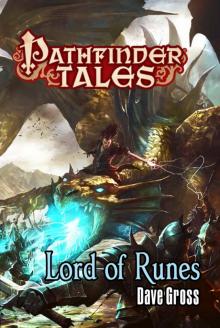 Pathfinder Tales- Lord of Runes
Pathfinder Tales- Lord of Runes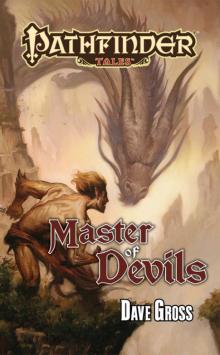 Master of Devils
Master of Devils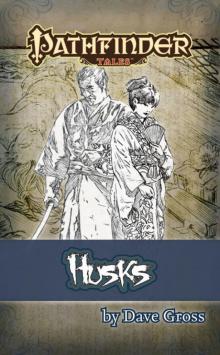 Husks
Husks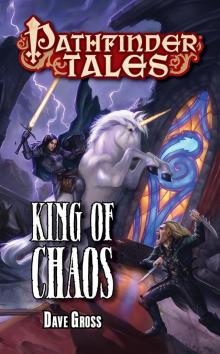 King of Chaos
King of Chaos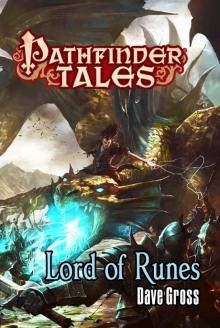 Pathfinder Tales: Lord of Runes
Pathfinder Tales: Lord of Runes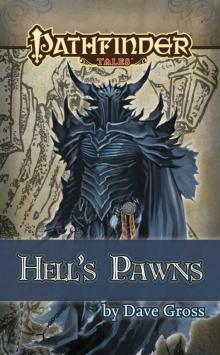 Hell's Pawns
Hell's Pawns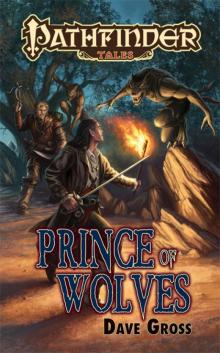 Prince of Wolves
Prince of Wolves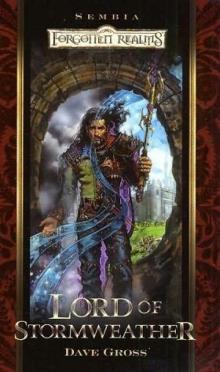 Lord of Stormweather fr-7
Lord of Stormweather fr-7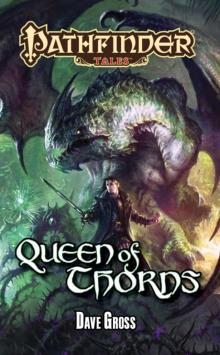 Queen of Thorns
Queen of Thorns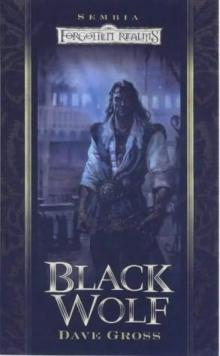 Black Wolf s-4
Black Wolf s-4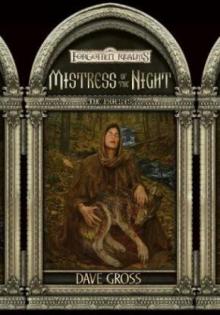 Mistress of the Night p-2
Mistress of the Night p-2